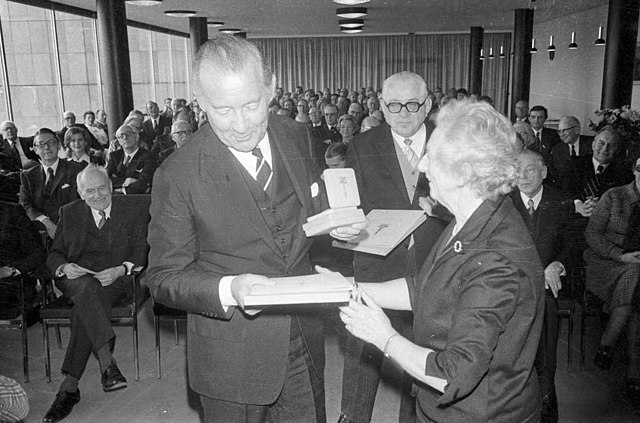Your cart is currently empty!
Axel Springer: Nazi, Zionist, Popagandist

Axel Springer, the German founder of one of Europe’s largest publishing empires, remains a divisive figure in history. His life reflects a tangled narrative of opportunism, ideology, and power, spanning his involvement in Nazi-era media, his fervent Zionist advocacy, and accusations of supporting policies tied to human rights abuses.
The Axel Springer company’s combined reach spans hundreds of millions of readers and users globally, with strongholds in European journalism, classifieds, and digital platforms. Its flagship brands, such as BILD and Business Insider, dominate in their respective markets, making Axel Springer SE one of the most influential media conglomerates worldwide.
In 2024, Axel Springer SE owns prominent publications including BILD (8 million daily readers), DIE WELT (800,000 daily readers), WELT AM SONNTAG (400,000 weekly readers), B.Z., AUTO BILD (2.5 million monthly readers), COMPUTER BILD (1.5 million monthly readers), SPORT BILD (1.7 million weekly readers), BILD DER FRAU (2 million monthly readers), Business Insider (100 million monthly users), POLITICO Europe (25 million monthly users), Upday (25 million monthly users), Fakt (3.2 million daily readers in Poland), Newsweek Polska, Forbes Polska, StepStone (30 million monthly users globally), Immowelt, and the AVIV Group.
The Nazi
Axel Springer’s early career unfolded during the rise of Nazi Germany, a period in which the media was heavily censored and controlled by Joseph Goebbels’ Ministry of Propaganda. As an editor for his family’s newspaper, Altonaer Nachrichten, Springer worked under a press system designed to disseminate Nazi ideology.
Nazi Propagandist
In Springer’s role as a editor, many argue that his participation in a Nazi-controlled newspaper made him complicit in propagating the regime’s messages. His ability to continue working in journalism during a time when press freedom was non-existent suggests at least tacit compliance with the regime’s policies.
While Springer is often portrayed as a minor figure at the publication, accusations persist that he contributed to antisemitic narratives during this time. His position at the paper and its adherence to Nazi propaganda policies suggest, at the very least, a degree of complicity in disseminating the regime’s ideology.
Dmitrij Belkin, a historian and curator, has extensively researched and written about Axel Springer and has pointed out that Springer’s involvement in antisemitic propaganda directly contradicts his later efforts to support Israel and German-Jewish reconciliation. According to Belkin, this hypocrisy was so significant that had it been publicly exposed in the late 1970s, it could have completely destroyed Springer’s reputation.

Divoricing his Jewish Wife
Springer’s personal life during this era adds to the controversy. In 1933, he married Martha Else Meyer, the daughter of a Jewish father — a decision that became unfavorable as the Nazis viewed this as “Blutschande” ( Blood Dishonor ) and Springers career was threatened. In 1938, Springer divorced Meyer, a move seen by many as a concession to Nazi racial policies to protect his career. A young editor aspiring for a significant career in the Third Reich could not afford a “non-Aryan” wife.
Close Relationship with “former” Nazis
In the Post-War period, several of Springer’s most successful authors and advisors were deeply implicated in the Nazi regime, raising serious questions about Springer’s judgment and complicity in rehabilitating figures with troubling pasts.
Paul Karl Schmitt
Paul Karl Schmitt, a former SS-Obersturmbannführer (equivalent to Lieutenant Colonel) and the head of the Press Office of the Nazi Foreign Ministry under Joachim von Ribbentrop, became one of Springer’s most prominent post-war collaborators. Writing under the pseudonym Paul Carell, Schmitt was one of the most successful authors of the post-war era, known for his bestselling books on World War II.
These books, including titles such as Hitler Moves East (Unternehmen Barbarossa), glorified the Wehrmacht’s actions during the war, often portraying German soldiers as heroic and noble while glossing over the atrocities committed by the Nazi regime. Schmitt’s work avoided any critical reflection on his role in disseminating Nazi propaganda during the war.
Notably, Schmitt maintained a close relationship with Axel Springer until Springer’s death in 1985. Despite widespread awareness of Schmitt’s Nazi background, Springer continued to publish and promote his works, giving him a platform to perpetuate a sanitized narrative of the Wehrmacht.
Horst Mahnke
Another troubling figure in Springer’s inner circle was Horst Mahnke, a former SS-Hauptsturmführer (Captain). Like Schmitt, Mahnke held significant positions in the Nazi apparatus during the war and later transitioned into a role in Springer’s media empire.
Similar to Schmitt, there is no evidence that Mahnke renounced or critically examined his Nazi past. His integration into Springer’s circle suggests a pattern of hiring individuals with deep ties to the Third Reich, without requiring accountability or a reckoning with their actions during the war.
Unrepentant Nazi Influence
Critics argue that Springer’s reliance on individuals like Schmitt and Mahnke reflected a broader failure to address the legacy of Nazism in post-war Germany. Both men avoided reckoning with their pasts, and their work under Springer often perpetuated the glorification of Germany’s wartime actions. The post-war cultural climate, which often sought to separate the Wehrmacht from the atrocities of the Holocaust, allowed figures like Schmitt to thrive, but Springer’s active collaboration with such individuals has drawn sharp criticism.
Suppressing the Truth: Springer and Der Spiegel
In 1979, Rudolf Augstein, Springer’s competitor and the publisher of Der Spiegel, sought to publish an article detailing Springer’s Nazi-era activities, particularly his involvement in antisemitic propaganda. The revelations were poised to shed light on Springer’s role at Altonaer Nachrichten and his editorial complicity during the Third Reich.
Springer, recognizing the existential threat this posed to his carefully curated image as a defender of Israel and advocate for Jewish reconciliation, intervened personally to prevent the publication of the article. His influence was reportedly sufficient to halt the story, preventing a full public reckoning with his Nazi-era past.
Belkin describes this intervention as pivotal, noting that exposure of Springer’s Nazi associations would have irreparably damaged his legacy.
The Zionist
From Nazi to To Zionist in a Year
After World War II, Axel Springer rebuilt his career with astonishing speed, founding Axel Springer Verlag in 1946. By the 1950s, his company had become a dominant force in European media. Springer explicitly aligned his media empire with Zionism, declaring support for Israel to be a core ideological principle of his organization.
“Israel’s right to defend itself.”
Axel Springer’s Zionism was not merely a political stance but a deeply personal crusade that shaped the ethos of his media empire. Following his first visit to Israel in 1966, Springer established a profound connection with the country. His media outlets, including BILD and DIE WELT, prominently championed Israel’s right to exist and defend itself. Israeli flags flew at Springer’s corporate headquarters, and he frequently emphasized the importance of German-Israeli relations as part of his company’s core values. This unyielding support extended to publishing narratives that aligned with Israeli government policies, even in the face of global criticism, particularly during conflicts such as the Six-Day War and subsequent territorial disputes.

Zionism Advocacy
Critics have accused Springer of fostering a one-sided portrayal of the Israeli-Palestinian conflict, suppressing dissenting voices, and using his media empire to propagate uncritical support for Israeli policies, including settlement expansions and military actions in occupied territories. His staunch opposition to pro-Palestine sentiments often resulted in labeling critics as anti-Semitic, creating an environment where nuanced debate about Middle Eastern politics was stifled. While supporters view his Zionism as a moral stand rooted in historical responsibility, detractors argue that it reflected a paternalistic approach that prioritized absolution for Germany’s past over genuine reconciliation or balanced reporting.
Supporting War Crimes
Springer’s Zionism was not limited to symbolic gestures. His newspapers, particularly BILD, consistently defended Israeli policies, including actions consitent with war crimes and breaking of international law such as the violence, murder, rapes, discplacement, ethnic cleansing and torture during the occupation of Palestinian territories. His company’s headquarters in Berlin flew the Israeli flag as a symbol of solidarity, and he established close ties with Israeli political leaders.
Critics argue that his fervor crossed the line into propaganda, with his media empire accused of stifling dissent and marginalizing pro-Palestinian perspectives. His media empire consistently framed Israeli military actions as defensive measures, even during events that drew international condemnation, such as the massacres at Sabra and Shatila in 1982. Critics argue that Springer’s outlets provided a one-sided narrative that ignored or downplayed the suffering of Palestinian civilians.
Moreover, Springer’s ideological alignment with Israel included tacit approval of policies that many view as contributing to systemic oppression. His newspapers dismissed criticisms of Israeli settlement expansion, often branding opponents as anti-Semitic, a tactic that stifled legitimate debate on the humanitarian crisis in occupied territories.
These actions have led some to accuse Springer of supporting what amounts to cultural and political genocide against Palestinians. While such allegations remain controversial, they highlight the darker implications of Springer’s ideological commitments and the power of his media empire to shape public discourse.
Modern Day Hate Speech
To this day, Axel Springer SE’s media outlets maintain a highly polarized stance on the Israeli-Palestinian conflict, where any pro-Palestinian or pro-peace movement is often characterized as being aligned with Hamas or even as harboring Holocaust denial. Publications like BILD and DIE WELT frequently frame criticism of Israeli policies, such as settlement expansion or military actions in Gaza, as inherently anti-Semitic or supportive of terrorism.
This approach stifles nuanced debate and delegitimizes voices advocating for peace or Palestinian rights, creating a narrative where opposition to Israeli government policies is equated with hostility toward Jewish people or complicity in historical atrocities. Such editorial choices reflect Axel Springer’s enduring ideological commitment to unqualified support for Israel, but they also exacerbate tensions by marginalizing legitimate calls for justice and reconciliation in the region.

The Propagandist
Axel Springer’s life and career reflect the archetype of a careerist who adeptly navigated the shifting ideological landscapes of 20th-century Germany. During the Nazi era, he participated in the regime’s propaganda apparatus, maintaining his professional footing in a system where aligning with the dominant ideology was often a prerequisite for survival or success. In the post-war years, Springer reinvented himself as a staunch Zionist and advocate for Jewish reconciliation, a position that not only aligned with Germany’s evolving moral and political responsibilities but also bolstered his personal and professional reputation in a transformed media landscape.
This ability to adapt, while securing his own interests, underscores a recurring theme in Springer’s life: embracing ideologies that best served his ambitions. Whether collaborating with former Nazis, championing Israel, or suppressing scrutiny of his own past, Springer consistently prioritized his career and influence over unyielding principles. While his contributions to German-Israeli relations and media innovation are undeniable, his opportunistic shifts between ideologies reveal a pragmatic, if ethically ambiguous, approach to power and legacy.
Share Your Perspective
Subscribe to Truthlytics today to stay informed and dive deeper into the issues that matter.
Already subscribed? Log in to join the conversation and share your thoughts in the comments below!




